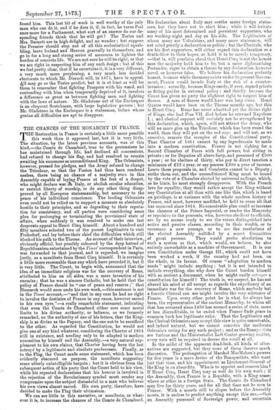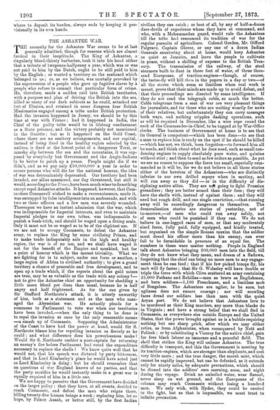THECHANCES OF THE MONARCHY IN FRANCE.
THE Restoration in France is certainly a little more possible this week than it appeared last, but it is very little. The situation, by the latest previous accounts, was of this
kind,—the Comte de Chambord, true to the pretensions he has maintained through life, had declined all concessions, had refused to change his flag, and had resolved to remain awaiting his summons as unconditioned King. The Orleanists, however, pressed for pledges, and the Army refused to change the Tricolour, so that the Fusion had thus been rendered useless, there being no chance of a majority even in this Assembly capable of laying France at the feet of a despot, who might declare war o1r Italy, or abolish secular education, or restrict liberty of worship, or do any other thing disap- proved by all European statesmanship, but necessary to the
peace of his individual conscience. The leading Orleanists even could not be relied on to support a measure so absolutely hostile to their principles, and so degrading to their reputa- tion for consistency, and all parties were considering some plan for prolonging or terminating the provisional- state of affairs, when suddenly it was resolved to make one last desperate appeal to Henri Cinq himself. About a hundred and fifty members selected two of the purest. Legitimists to visit Frohsdorf, and lay before their chief the difficulties which still blocked his path to the Throne. An account of their interview, obviously official, but possibly coloured by the deep hatred of Republicanism entertained by the Times' correspondent in Paris, was forwarded to that journal, and is regarded, we imagine justly, as a manifesto from Henri Cinq himself. It is certainly a little more reasonable than any which have preceded it, but it is very little. The Count, to begin with, announced that the idea of an immediate religious war for the recovery of Rome, attributed to him on all sides, was a mere invention of his enemies ; that he was a sincere Catholic, but he held that the policy of France should be " one of peace and reserve ;" that Bismarck would soon undo his own work,—this sentence is not in the Times' account,—" and that in any case he had no right to involve the destinies of France in any cause, however sacred in his own eyes,"—a really remarkable statement, indicating that even the Comte de Chambord either sees some moral limits to his divine authority, or believes, as we formerly remarked, on the authority of one of his letters, that the King- ship is as divine as the Papacy, and the one not to be sacrificed to the other. As regarded the Constitution, he would not give one of any kind whatever, considering the Charter of 1814 still in existence, and needing only to be adapted to modern necessities by himself and the Assembly,—a very natural sup- plement to his own claims, that Charter having been the last octroye by a legitimate and absolute predecessor. Finally, as to the Flag, the Count made some statement, which has been evidently obscured on purpose, the manifesto suggesting some utterly unintelligible bargain ; but it is obvious from the subsequent action of his party that the Count held to his view, while his repeated declarations that his honour is involved in the rejection of the Revolutionary symbol must render any compromise upon the subject distasteful to a man who believes his own views almost sacred. His own party, therefore, have decided to make the Flag their ultimatum.
We can see little in this narrative, or manifesto, or what- ever it is, to increase the chances of the Comte de Chambord. His declaration about Italy may soothe many foreign states- men, but they have not to elect him ; while it will irritate many of his most determined and persistent supporters, who are working night and day on his side. The Legitimists, of whom many are Voltairians, and many more statesmen, will not mind greatly a declaration so politic ; but the Clericals, who are his first supporters, will either regard this declaration as a death-blow to their hopes, or hold it to be merely temporary, —that is, will proclaim aloud that Llenri Cinq is not the honest man the majority hold him to be, but a mere diplomatising Pretender, eager to obtain a throne by any declaration, however novel, or however false. We believe his declaration perfectly honest, because while Germany exists under its present Govern- ment, France would invade Italy at the risk of a counter- invasion ; secondly, because Kings rarely, if ever, regard priests as fitting guides in external policy ; and thirdly. because the Count has given no party the slightest right to suspect him of finesse. A man of finesse would have won long since. Henri Quatre would have been on the Throne months ago, but this is Henri Cinq. Rome has never admitted yet the divine right of Kings, else had Pius VII. died before he crowned Napoleon I. ; and clerical support will certainly not be strengthened by this declaration, which, again, will not attract the Army, who will no more give up the Tricolour, which has been round the world, than they will put on the red cap; and will not, as we conceive, remove the scruples of the Constitutional party. That Charter of 1814 cannot by any legerdemain be made into a modern constitution. France is not sighing for a Second Chamber of Peers with full powers, but sitting in private ; or for Deputies all above forty, and possessed of £500 a year ; or for electors of thirty, who pay in direct taxation a minimum of £12 a year, or say possess £200 a year of income. Leave these proposals in, and Gambetta cannot be a Deputy ; strike them out, and the unconditioned King must be bound by the vote of a Chamber elected by universal suffrage, which, as he hints, he most strongly disapproves. With the French love for equality, they would rather accept the King without any Constitution at all than with one like this, which is based on privilege, is at variance with the whole modern history of France, and must, however modified, be held to erase all that has occurred since 1814. No conceivable plan could so increase the chances of the Prince Imperial, or render the Monarchy so repulsive to the peasants, who, however obedient to officials, are by no means ready to see the voters distinguished into active and passive classes, according to their wealth, or to reverence a new peerage, or to see the resolutions of the elected Assembly nullified by a secret Committee
of great persons. They would prefer absolutism to such a system as that, which would, we believe, be also entirely unworkable as a machine of Government. It is our own Constitution under George Ill., which could not have been worked a week, if the country had not been, on the whole, in its favour. Of course "adaptation to modern needs " might include anything ; but it is not intended to
include everything, else why does the Count burden himself with so ancient a document, when he might easily octroyer a constitution for himself ? The truth is, we suspect, he has not altered his mind at all except as regards the expediency of an immediate war for the recovery of Rome, which anybody but a fanatic Clerical can see might involve the very existence of France. Upon every other point he is what he always has been, the representative of the ancient Monarchy, to whom all that has occurred since 1830 has seemed a series of riots, more or less discreditable, to be ended when France finds grace to summon back her legitimate ruler. That the Legitimists and the Clerical Orleanists may accept this view is quite conceivable, and indeed natural, but we cannot conceive the moderate Orleanists voting for any such project ; and as the Bonapartists are furious and the Ministerialist Left Centre growing restive, every vote will be required to decree the recall at all.
In the midst of the apparent dead-lock, all kinds of alter- natives are suggested, but they none of them deserve much discussion. The prolongation of Marshal MacMahon's powers for five years is a mere device of the Bonapartists, who want just that time, and his appointment as Lieutenant-General of the King is an absurdity. Who is to appoint and remove him If Henri Cinq, Henri Cinq may as well do his own work ; if the Assembly, then France is a Republic, with a King some- where or other in a foreign State. The Comte de Chambord may live for thirty years, and for all that time not be seen in France. With a month still to elapse before the Assembly meets, it is useless to predict anything except this one,—that an Assembly possessed of Sovereign power, and uncertain where to deposit its burden, always ends by keeping it pro- visionally in its own hands.



































 Previous page
Previous page